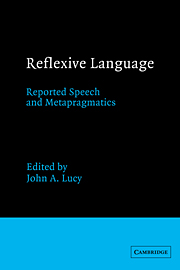Book contents
- Frontmatter
- Contents
- Acknowledgments
- General introduction
- Part I Theoretical foundations
- Part II The relation of form and function in reflexive language
- Part III Text, context, and the cultural functions of reflexive language
- Part IV Interpretation, reported speech, and metapragmatics in the Western tradition
- Introduction to Part IV
- 11 Text, transference, and indexicality
- 12 The importance of reflexive language in George H. Mead's theory of self and communication
- 13 Where epistemology, style, and grammar meet literary history: the development of represented speech and thought
- 14 Metalanguages and subjectivities
- 15 Re-creating Genesis: the metapragmatics of divine speech
- Name index
- Subject index
Introduction to Part IV
from Part IV - Interpretation, reported speech, and metapragmatics in the Western tradition
Published online by Cambridge University Press: 22 January 2010
- Frontmatter
- Contents
- Acknowledgments
- General introduction
- Part I Theoretical foundations
- Part II The relation of form and function in reflexive language
- Part III Text, context, and the cultural functions of reflexive language
- Part IV Interpretation, reported speech, and metapragmatics in the Western tradition
- Introduction to Part IV
- 11 Text, transference, and indexicality
- 12 The importance of reflexive language in George H. Mead's theory of self and communication
- 13 Where epistemology, style, and grammar meet literary history: the development of represented speech and thought
- 14 Metalanguages and subjectivities
- 15 Re-creating Genesis: the metapragmatics of divine speech
- Name index
- Subject index
Summary
Part IV, “Interpretation, reported speech, and metapragmatics in the Western tradition,” examines the significance of an understanding of reported speech and metapragmatics for a variety of other scholarly traditions developed in the West. Two themes that run through all of these chapters are the intimate linkage between the use of reflexive language and conceptions of human consciousness (or “inner” experience), and the importance of speakers' ideologies of language and language use in the creation and interpretation of texts.
The first two chapters deal explicitly with psychological theories. In Chapter 11, Crapanzano shows how an understanding of metalinguistic activity can illuminate Freud's psychoanalytic theory and practice. He begins by noting that Freud's metapsychology had difficulty characterizing the transference phenomenon in the psychoanalytic encounter. Crapanzano argues that the difficulty stems from Freud's attempt, deeply rooted in the Western tradition, to treat the transference as a text much in the same manner as he had treated dream texts. Through a detailed examination of Freud's well-known analysis of Dora, Crapanzano makes it clear that the transference phenomenon cannot be approached like the interpretation of a text since there is no autonomous text existing prior to or aside from the encounter. The transference is a pragmatic creation of the analytic encounter itself and is therefore difficult to accurately characterize with metalinguistic formulations since the latter systematically emphasize what is presupposed rather than what is created in an encounter.
Information
- Type
- Chapter
- Information
- Reflexive LanguageReported Speech and Metapragmatics, pp. 289 - 292Publisher: Cambridge University PressPrint publication year: 1993
